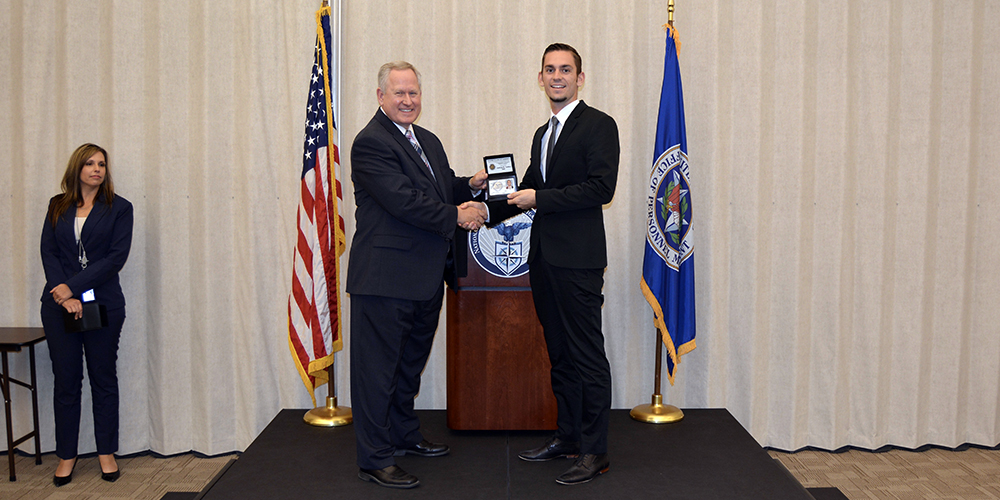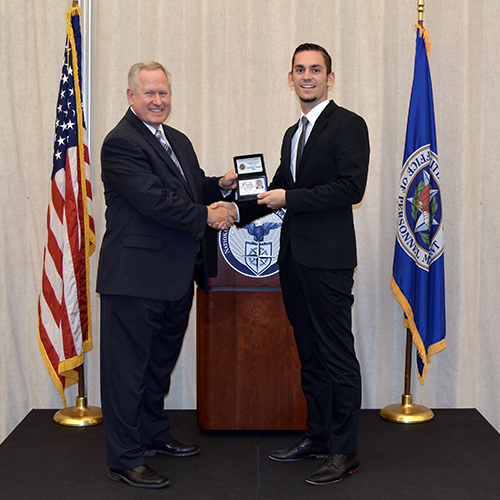
8 Things to Know About Working for a Federal Agency
Before graduating with a communications degree Joshua Tarbox (UH Hilo BA '14; Hawai‘i CC AA '13) spent a semester abroad in Rio de Janeiro, Brazil. He says, “I am very thankful for the advice and help Carolina Lam at the Center for Global Education has given me over the years. It is safe to say that I would not be where I am today professionally without having a mentor like Carolina, and without the opportunity to be a Global Vulcan.”
Right after his graduation, he served in the Peace Corps in Western Samoa, where he taught English literacy to students from 4th through 8th grade, funded the school’s first library, and taught villagers to build and maintain fish ponds to improve residents’ nutrition and to generate income.
 Today, he is a Special Agent, Federal Investigator with the National Background Investigations Bureau (NBIB), for the US Office of Personnel Management. He’s conducting background investigations for the federal government and administering national security clearance interviews to current and potential federal employees. Here he shares some of his experience with the NBIB.
Today, he is a Special Agent, Federal Investigator with the National Background Investigations Bureau (NBIB), for the US Office of Personnel Management. He’s conducting background investigations for the federal government and administering national security clearance interviews to current and potential federal employees. Here he shares some of his experience with the NBIB.
- Career fairs are a great place to start
I attended a career fair in Washington, D.C. after serving in the Peace Corps. Several people I met that day had been federal agents for many years. One woman was so cool, everything about her—her style, the way she held herself, and how approachable she was. I kept speaking with her, and gave her my resume. I emailed her a few days later and told her how great it was to meet her. Long story short: she passed my resume along, and I got a call for my first interview!
- Our work makes a difference
A colleague of mine said it perfectly, “We are helping tons of American civil servants, military personnel, and contractors put food on their tables and provide for their families by ensuring they are cleared to work for America. We are also helping our nation protect itself from those who wish to cause harm, by ensuring they do not get the opportunity to do so from within.”
The best feeling I have gotten from work was on a very messy case that sounded like a script from the T.V. show “Law & Order.” I asked the perfect question, leading the person to own up to what he had done. That feeling of catching someone in a lie and helping to protect our federal workforce from insider threats is what keeps me going.
- Diversity strengthens our teams
I love how diverse my agency is in New York City. My team is the most diverse I have ever been a part of, with agents from all different cultural backgrounds, ethnicities, and lifestyles. Our office in particular has people from many different walks of life, all working toward one common goal, with a strong work ethic. Even though we do not see each other daily, the work being completed is admirable.
- Studying and working abroad have advantages…
The Peace Corps gave me a foundation of cultural skills and an understanding of communication I could never have otherwise. There is such a strong link between Peace Corps and NBIB. While I was in the Peace Corps I was representing the US; now I feel like I am protecting the US.
- …especially if you’ve recently served in the Peace Corps!
I was eligible for consideration with NBIB because I had successfully finished serving in the Peace Corps. An executive order grants returned Peace Corps volunteers noncompetitive eligibility for 12 months after their service. This status allows government agencies to hire us hardworking Peace Corps folk without having to go through the lengthy competitive hiring process. It also allows us to apply for positions that are for internal hire only! This is great for the agency too because it now has a different pool of talent to choose from!
- Getting hired is difficult, but the training is brutal!
After many interviews, an essay, and a full background investigation, I attended the Federal Background Investigator Training Program in Pennsylvania for six weeks. This schooling was the most difficult thing I’ve ever done, but after days of class and study, I passed! Receiving my credentials and badge was definitely a milestone.
- Driving in Hawai‘i may be bad, but it’s nothing compared to driving in New York City
The worst part of my job is dealing with New York City traffic. I know traffic in Hawai‘i is bad, but New York is worse. I think I got honked at more times in my first week here than all my years in Hawai‘i combined.
- It’s cold and gloomy without beautiful scenery to look at while you are driving
- People are angry, and they drive aggressively
- They drive super-fast even though it is bumper to bumper
- There are so many potholes
- You can't turn right on red
- Reaching a goal means it’s time to set a new one
I have learned that when you reach a goal, it is time to make another goal! NBIB has taught me to work diligently, pay attention to detail, and continue improving who I am. NBIB and my supervisor have provided extensive training and seminars. They have also accepted me into the NBIB Tuition Reimbursement Program, which helps with my tuition in graduate school. This past January I started attending Columbia University part-time and am working toward my next goal of a Masters in Negotiation and Conflict Resolution.
To learn more about the Global Vulcans program, please visit https://hilo.hawaii.edu/studyabroad
Please support the Global Vulcan program with a donation to the Audrey S. Furukawa Study Abroad Scholarship or the Gertrude E. McVickar Endowed Excellence Scholarship for Study Abroad.
